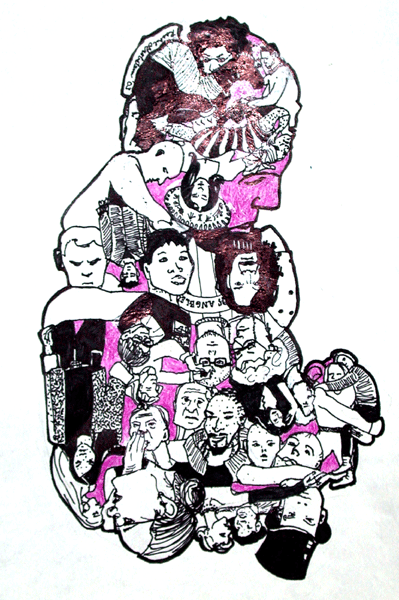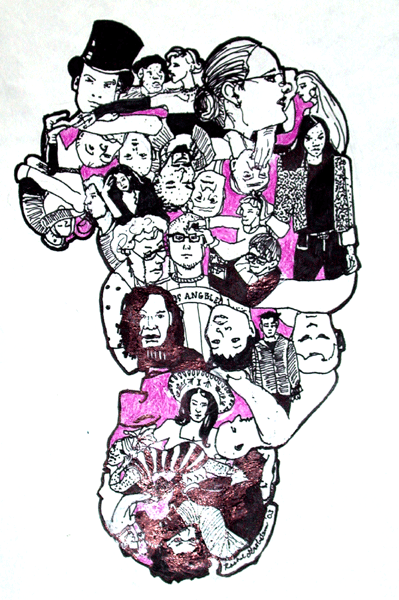Made available on Serendip
In association with Making Sense of Diversity: An Exploration, a world wide conversation

|
October 21, 2005
Ruth Conboy
"One Size Does Not Fit All:
Body Issues and Images"
Participants
Summary
Prepared by Anne Dalke
Additions, revisions, extensions are encouraged
in the
On-Line Forum
| 
|
Ruth initiated discussion by reading a definition of "body image" -- "the subjective concept of one's physical appearance, based on self-observation and the reaction of others"--from dictionary.com, and asking for reactions, responses and revisions. Conversation ranged from a discussion of the media (the "heroin chic" look of Kate Moss and the controversy surrounding the recent Dove ads), through the philosophical (the "body is that which can be controlled," by which we "articulate something about ourselves"), to the practical ("it's not all negative, and not all about size; there is a matter of health"). We talked about the function of advertising ("an idyllic fantasy, that makes you want to buy the product so you can look like the model"), and about the "translation" of the ideal figure from Greek art into the contemporary fashion industry, so that we have come to think of our bodies as "works of art," and are willing to undergo cosmetic surgery to make them appear more "perfect." What will this trend mean for our daughters? To what extremes will they go, to re-work their bodies?
Eating disorders are everywhere; they are a "glamour thing, an emotional thing, a ritual thing, an irrational thing, just a teenage girl thing." Some of us, sharing a room when we come to college, encounter for the first time daily comments about body image, about weight, about the "freshman 15." A room decorated with "a wall of celebrity skeletal women" can seem "the center of negative body image." For others, coming from high schools where "the idea of body image ruled," Bryn Mawr's campus seems, in contrast, a place that "de-emphasizes the physical."
In what ways is body image a particular issue at Bryn Mawr?
When you first arrive on campus, you are meeting a lot of people who don't know anything about you; how you look can have an impact on how you are seen, on other's expectations of you, and on who you are. This is a campus full of perfectionists, obsessive about "every aspect of our lives, including our bodies." Or is "the reverse thing" true: "we are not here to be well put together; we think of ourselves as smart, not pretty"? Do we really have to choose between these "silly dicotomies"? Must "I feel pretty" always be relational? Can we admire ourselves for who we are? How much do we define ourselves through our looks? We think that we are "supposed to be above the body focus thing," but our physical bodies are important, and we can pay attention to them without "betraying feminism."
Eating disorders have no relationship to intelligence. You don't decide to have an illness (no one wakes up and says, "I think I'll become anorexic"). On the other hand, recovery books are often used as handbooks on how to manage the illness, a means to actively cultivate pathology. There are "pro-anorexia" web sites, filled with diet tips and "thinspiration." Women insist that they have "made a decision to live their lives this way."
Anorexia is very common among dancers. This is promoted by the dance aesthetic of thinnness, but there also seem to be issues of power involved. If other aspects of one's life seem out of control, managing what goes into your mouth can be one way to exercise agency. Having an eating disorder can be a means of "watching people watch you," and of rebelling against parental control.
Mention was made of a recent course on Beauty, in which the feminine pursuit of the beauty ideal became a heated topic. In a high school project requiring a "self portrait," one student refused to use any photographs of herself: "I didn't want how I look to portray who i was; I wanted to be purely me as a person, with mental and emotional qualities, not physical ones." Another student offered a counterview, describing the pleasure of photographing herself, of controlling how she was depicted, of showing her physical self as complex, malleable, not fixed.
Several students spoke of their own histories of struggling with eating disorders: "it had nothing to do with how I looked. The physical was a manifestation of psychological issues." If you seek help for the underlying issues (of insecurity, etc.)
"the eating will resolve itself." Parents can be the best support--or the worst; sometimes they will deny that their child has a disorder. How to help a friend who is worried about her body image? If someone chooses food as a way to define herself, there is not much that others can do to interfere.
Unfortunately, there is still a stigma around issues of mental illness--even at Bryn Mawr, where the "easy going" mental health center staff offers six free sessions to any student.
We might "refuse to engage in the dramatic narrative" of someone with an eating disorder; "don't make her the center of attention"; what she is doing is neither sentimental nor romantic. "She's a big girl; it's her call." Try to stop participating in the drama; say something like, "This makes me feel bad. Your body image does not not get to define this space."
Might we model our conversation on a summer camp where there was "no body talk, good or bad" allowed? Or does the attempt @ such "transcendence" avoid the fact that we ARE bodies, physical beings, engaged in a natural process? Adolescents are so self-focused; we should not be unconcerned about how we look.
Ruth closed the conversation by observing that body issues can be very serious. This "can be scary stuff"; some people who are really sick do need intervention. She reminded us of all the resources available in the Bryn Mawr health center, the athletics staff here, and on the web site of the Body Image Council, which includes tips on "How to Help a Friend."
Discussion continues in the on-line forum on "Making Sense of Diversity," and will resume in person on Friday, November 11, when Chris McDonald-Dennis and Rachel Robbins will lead a discussion of "The Politics of Sexual Orientation."
| Return to Schedule for Friday Noon Conversations

| Bryn Mawr Conversations
| Archived
Forum
| Archive of Bryn Mawr Conversation
| General Conversation
| Serendip Home |
These pages are sponsored by the Bryn Mawr College Office
of Intercultural Affairs, the Center for Science and Society and the Serendip
website. Send us additional comments or suggestions at Serendip
© by Serendip 1994-
- Last Modified:
Wednesday, 21-June-2005 15:18:00 EST

